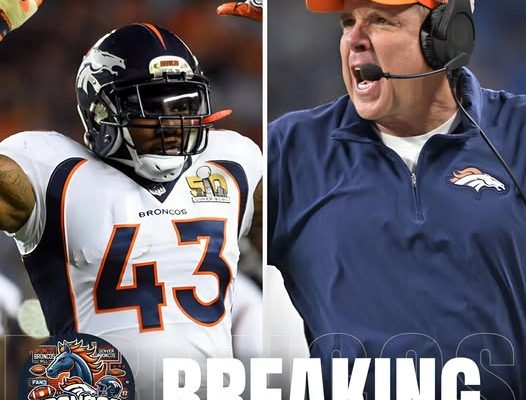The Denver Broncos made headlines for all the wrong reasons when news broke that a rookie offensive tackle had been released just hours after showing up to practice intoxicated. The incident, which quickly made its way around the league and through sports media outlets, wasn’t just a disciplinary action—it was a public statement about accountability, professionalism, and the unforgiving nature of life in the NFL. According to team insiders, the decision was swift and decisive, with little debate among the coaching staff and front office once the details emerged. For a rookie, making a first impression is everything, and in the high-pressure, high-visibility world of professional football, mistakes can be costly. In this case, the cost was immediate unemployment and a tarnished reputation before his career ever truly began.
Reports indicate that the player arrived at the team facility exhibiting signs of intoxication, something that did not go unnoticed by teammates and coaches. In a league where preparation, focus, and mental sharpness are critical for success, arriving under the influence of alcohol is seen not just as unprofessional but as a blatant act of disrespect toward the team, the coaches, and the game itself. The Broncos, who are in the middle of building a disciplined and competitive roster under a leadership group that has repeatedly emphasized culture, wasted no time addressing the matter. “You want to party? Do it while you’re unemployed,” one source close to the situation was quoted as saying—a blunt but telling reflection of the organization’s stance.
The decision reverberated quickly through the locker room. For veterans, it was a reminder of the standards required to stay in the league. For other rookies, it was a harsh introduction to the reality that talent alone doesn’t keep you employed. In the NFL, discipline and accountability often matter as much as physical skill. Coaches frequently preach that off-the-field behavior is just as important as on-the-field performance, because a player’s choices directly affect not only their own readiness but also the trust and cohesion of the team. In a sport where one player’s lapse can lead to breakdowns in execution or even injuries, there’s very little room for selfishness or carelessness.
From the front office’s perspective, this move wasn’t just about punishing one player—it was about sending a message. The Broncos are not a team currently in a position to carry distractions or tolerate behavior that undermines their culture. In recent years, the NFL as a whole has become more proactive in addressing unprofessional conduct, whether it involves off-field legal troubles, substance abuse, or failure to meet team expectations. By cutting ties so quickly, Denver reinforced the idea that wearing an NFL jersey is a privilege, not a right. For this rookie, the lesson is particularly painful: the opportunity he worked for through years of college football, training camps, and offseason workouts was lost in a single, poor decision.
The reaction from fans was mixed but leaned heavily toward support for the team’s firm stance. Many applauded the Broncos for refusing to look the other way, especially when dealing with a young, unproven player who hadn’t yet earned a spot as a core contributor. Social media was flooded with comments about professionalism, with some former players weighing in to stress how easy it is to lose a career before it even starts if you don’t respect the job. Others used the incident to highlight the pressures rookies face in the NFL—suddenly moving into the spotlight, handling newfound wealth, and navigating the intense physical and mental demands of the game. While these pressures are real, they are also well-known, and the league offers support systems like rookie transition programs and mentoring to help young athletes avoid exactly these kinds of mistakes.
The ripple effect of this move will likely linger through the Broncos’ preseason and into the regular season. Coaches now have a real-world example they can point to when warning players about consequences. Team leaders in the locker room—captains and respected veterans—may use this moment to reinforce discipline among younger teammates. It’s one thing to hear a speech about accountability; it’s another to see a teammate’s career derailed in an instant. And for players on the roster bubble, the takeaway is unmistakable: every choice counts, every day, both on and off the field.
The NFL is full of cautionary tales of players who let immaturity, bad habits, or poor decision-making destroy what could have been promising careers. Some find redemption later, after years of work and reflection, but many fade into obscurity. For a rookie to face this kind of setback so early, the path back into the league becomes exponentially harder. Other teams will look at the situation and question whether the risk of signing him outweighs the potential reward. In a league where hundreds of athletes are competing for the same limited roster spots, the margin for error is razor-thin. Talent may open the door, but character and professionalism keep it open.
For the Broncos, this was also a test of their own cultural identity. New coaching staffs often talk about “changing the culture” or “establishing a standard,” but those phrases only carry weight if the actions match the words. By cutting this rookie so quickly, the organization avoided the perception of favoritism or leniency, even though it would have been easy to simply fine the player or suspend him temporarily. Instead, they opted for the more drastic route, showing that no one is above the team’s rules and expectations. That kind of decisiveness resonates not just in the locker room but across the league, signaling to free agents and future draft picks what kind of program they would be joining.
The player in question now faces an uphill battle to repair his image and revive his career. He will likely need to demonstrate contrition, maturity, and a commitment to professional standards if he hopes to earn another shot in the NFL. History shows that it is possible—some players have rebounded from early missteps to have successful careers—but it requires hard work, humility, and a willingness to take full responsibility for past actions. In the meantime, his story serves as a very public warning to every other young athlete with aspirations of making it in professional football: the spotlight is unforgiving, and mistakes made in that light can have permanent consequences.
Ultimately, this situation underscores one of the oldest truths in professional sports: discipline is non-negotiable. Whether you’re a Hall of Fame veteran or an undrafted rookie, the expectations are the same—show up prepared, respect the opportunity, and conduct yourself in a way that elevates the team. For the Denver Broncos, this wasn’t just a roster move; it was a statement of values. And for every rookie walking into an NFL facility this week, it’s a reminder that in a league where dreams can be realized or destroyed in an instant, the line between success and failure often comes down to choices made far away from the bright lights of game day.



